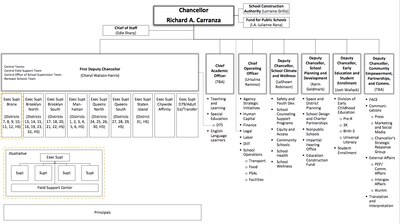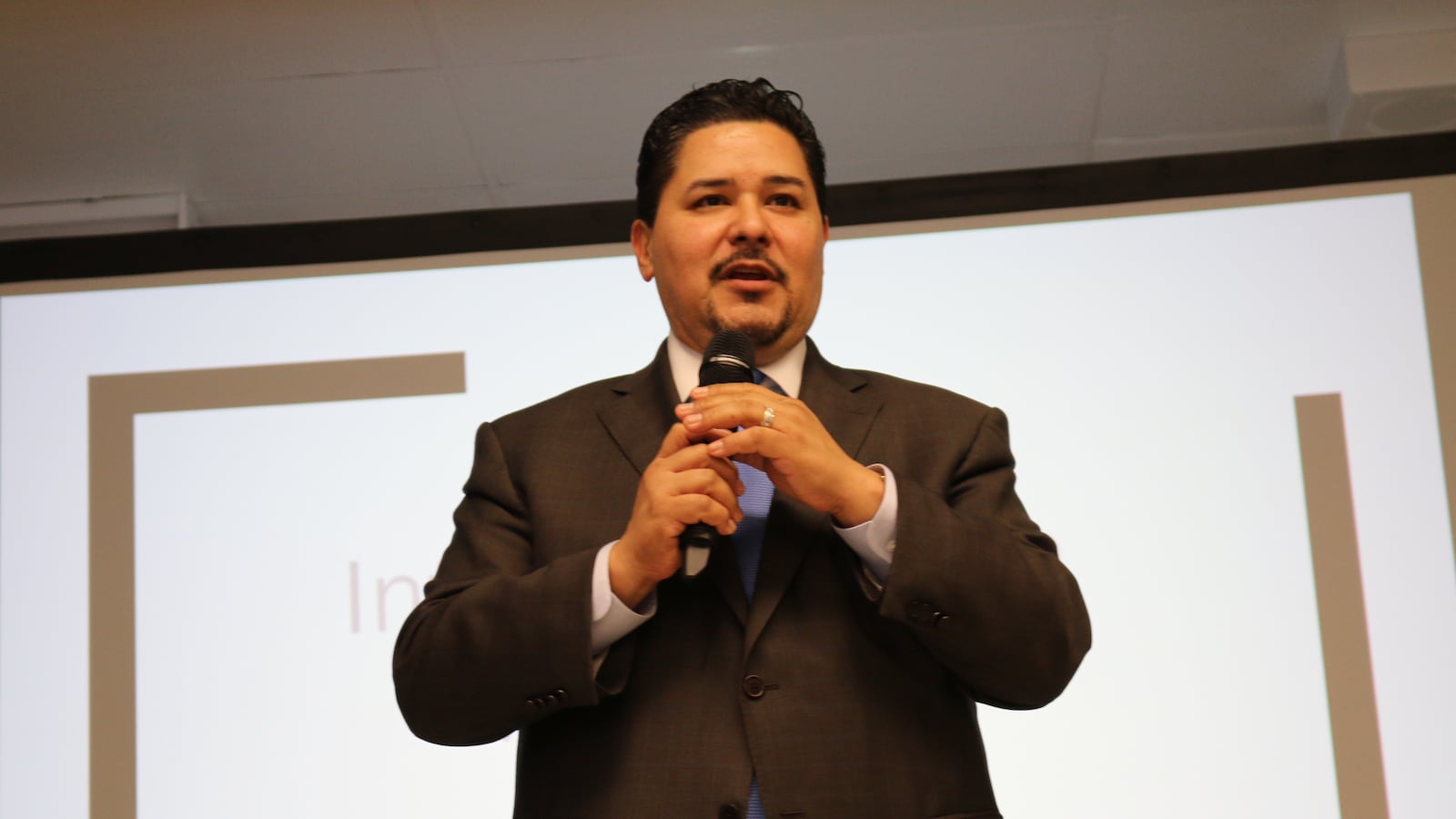Just three months into his tenure leading the nation’s largest school system, schools chancellor Richard Carranza announced a major personnel shake-up at the city’s Department of Education.
The sweeping new structure is meant to “streamline” the way principals and district superintendents are supported by creating another level of executive superintendents, the education department said.
The effort to create clear lines of command is reminiscent of a reorganization that former Chancellor Carmen Fariña instituted when she took the helm of the nation’s largest school system. However, the overhaul is also likely meant to correct for some elements of Fariña’s plan that have drawn criticism, including from principals who complained they weren’t always sure where to go to seek support. In addition, the changes appear to demote or revise the responsibilities of several key leaders who served under Fariña.
Dorita Gibson, who served as Fariña’s top deputy, and oversaw the entire school support system, will now serve as an “executive advisor” on community engagement. Elizabeth Rose, another Fariña deputy, will become the “CEO for school operations.”
Phil Weinberg, who served as a deputy chancellor under Fariña, will now report to the chief academic officer — instead of reporting directly to the chancellor. Milady Baez, another deputy who oversaw English learners, has left the education department entirely.
The new structure will introduce nine new executive superintendents to the system’s governance — a level of oversight that didn’t previously exist. This new leadership will oversee both the district superintendents who manage school principals and the Field Support Centers that provide help to principals with everything from budgeting to teacher training. The change appears to address a complaint sometimes voiced by school leaders that it was not clear who is directly responsible for supporting schools, since the superintendents did not directly supervise the field support centers.
“Principals have shared that they sometimes receive conflicting messages from multiple offices within the DOE,” Carranza wrote in a report based on his “listening tour” that was also released Wednesday. “My takeaway is that we need to communicate more clearly and consistently with educators, parents, and stakeholders.”
Those nine new executive superintendents, who have not yet been hired, will be overseen by Cheryl Watson-Harris, who will serve as First Deputy Chancellor.
Watson-Harris led the field support offices since 2017, but her role recently expanded to oversee the Renewal turnaround program for struggling schools — and she was even rumored to be a chancellor candidate, prior to Carranza’s appointment.
Also rising in the ranks of the chancellor’s inner-circle, LaShawn Robinson will serve as the Deputy Chancellor of School Climate & Wellness, who will oversee the district’s vision for supporting students socially and emotionally.
Karin Goldmark, who served as senior education advisor to First Deputy Mayors Dean Fuleihan and Anthony Shorris, will become the Deputy Chancellor of School Planning & Development and lead efforts to open new schools, as well as coordinate with charter schools.
In the announcement on Wednesday, Carranza said he made the decisions based on feedback he received while touring the district after taking the reins from Fariña in April.
Fariña’s changes were largely meant to give more power to superintendents to shape instruction and oversee principals. They were a reaction to the power structure ushered in by former Mayor Michael Bloomberg, who favored giving principals more authority to make decisions about their schools.
While some argued the Bloomberg-style leadership structure didn’t provide enough support or guardrails for principals, many principals felt overcome with too much paperwork and too little autonomy under Fariña. It’s unclear whether Carranza’s new structure will become an additional burden on principals or help alleviate some of the pressure they are under.
Here are other positions to note:
- A new position of Chief Academic Officer was created but is unfilled.
- Phil Weinberg’s new title: Deputy Chief Academic Officer for the Division of Teaching & Learning.
- Corinne Rello-Anselmi’s new title: Deputy Chief Academic Officer of Special Education and Student Services.
- Mariano Guzmán is the interim Deputy Chief Academic Officer of English Language Learners and Student Support.
- Josh Wallack will continue as Deputy Chancellor of Early Education and Student Enrollment.
- Ursulina Ramirez will continue as Chief Operating Officer.
- In May, Carranza appointed Edie Sharp, a former aide to Mayor Bill de Blasio, as his chief of staff.


